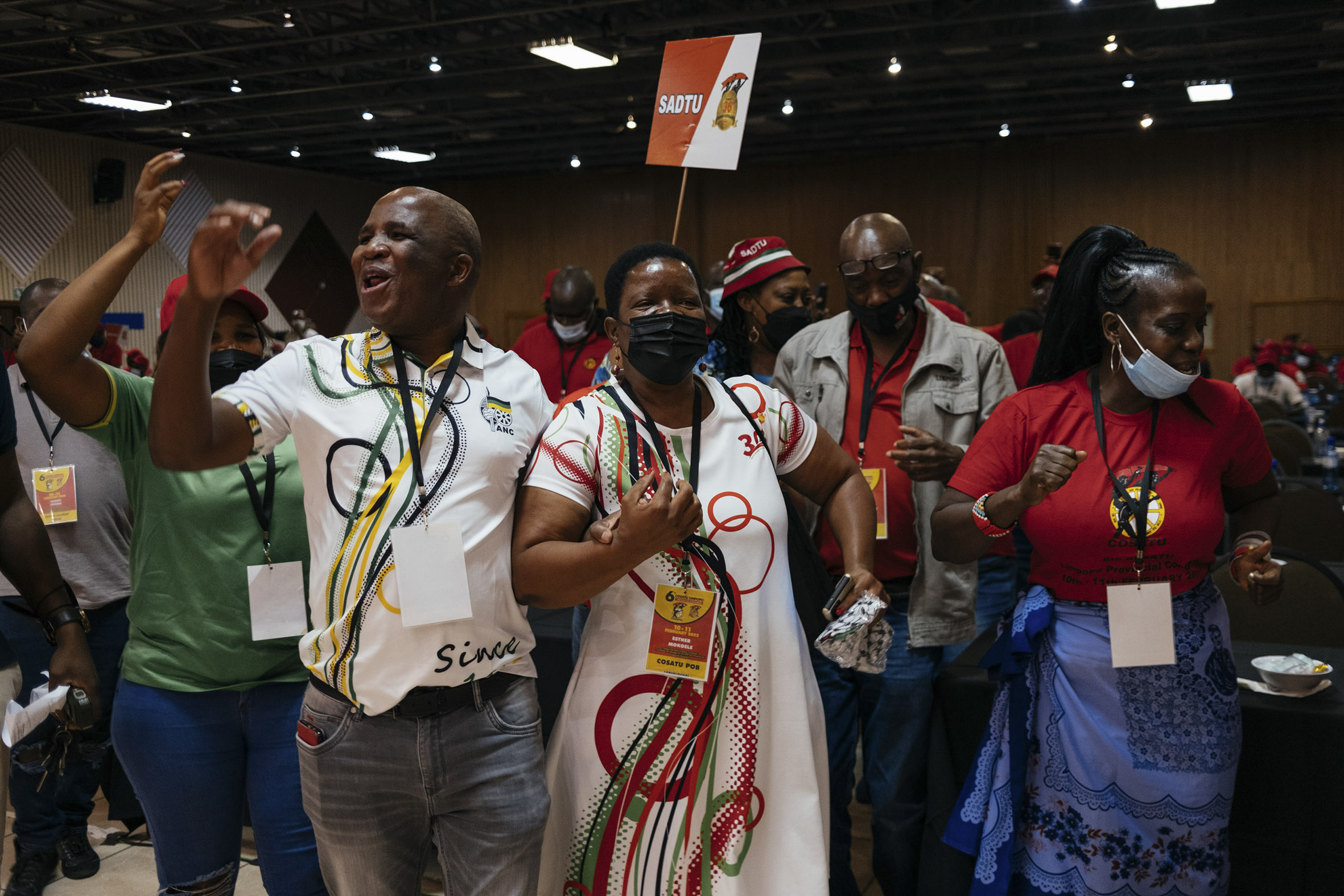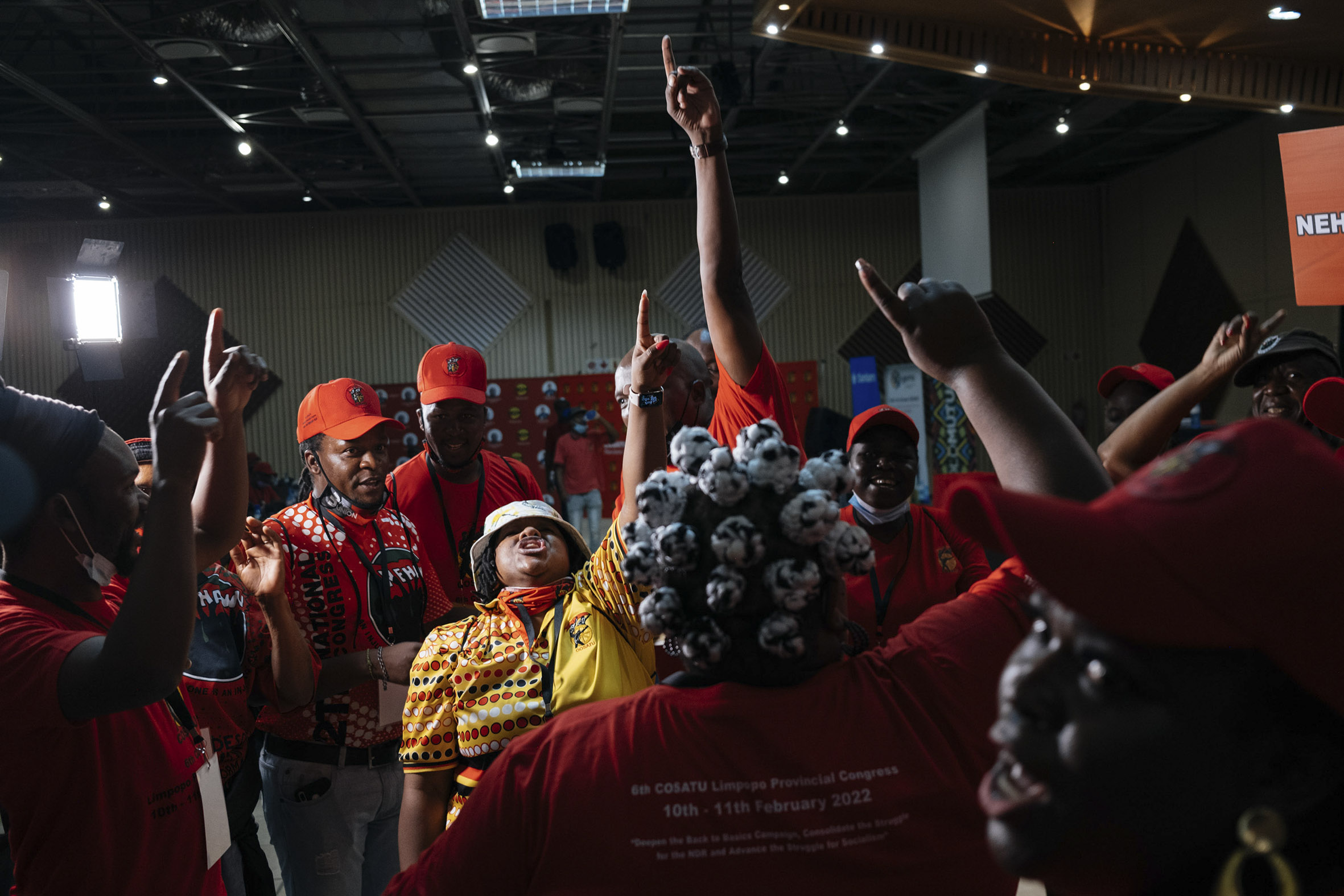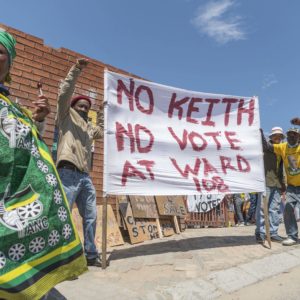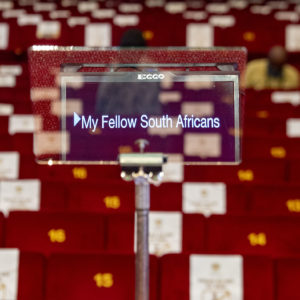Ester Mokoele makes history as Limpopo’s Cosatu head
When the first woman to lead the federation in the province delivered her opening address she critiqued the ANC for its attack on collective bargaining and pushed it for answers to unemployment.
Author:
16 February 2022

The news that Ester Mokoele, 54, would lead the Congress of South African Trade Unions (Cosatu) in Limpopo was met with jubilation. Mokoele is the first woman to head the federation in the province.
Delegates whistled, sang and praised Mokoele’s daring disposition as she addressed a crowd of more than 500 from 16 unions affiliated with the federation at Limpopo Cosatu’s sixth Congress.
Hangwani Mashao from the Police and Prisons Civil Rights Union is Cosatu’s deputy chairperson in the province; the treasurer is Mike Manganye from the South African Society of Bank Officials; and the provincial secretary is Gerald Mkhomazi Twala, who was elected for a second time.
“I feel honoured and excited that I will take the struggle of workers forward because that is what I’ve been doing throughout the better part of my life,” Mokoele said. “I am so humbled and happy that the members of Cosatu have realised that I have [the] potential to lead them.”

She said she wants to focus on doing exceptionally well at the work for which she has been elected – and to let the way she manages her responsibilities be the deciding factor as to whether she is re-elected or promoted to a national position.
“The comrades did not just wake up and want to be led by a woman,” Mokoele said, explaining that she has been in the struggle for workers’ rights for a long time. Between 2005 and 2010 Mokoele served as deputy chairperson for the South African Democratic Teachers’ Union (Sadtu) in Limpopo’s Mononono branch. Her rise through the ranks of the federation started in 2007 when she became chairperson in the Polokwane local structure.
Since then, she has been climbing to higher positions in her union and in the federation to which Sadtu is affiliated. She became the chairperson of the union in the province in 2019, and in the same year, she was elected the provincial deputy chairperson of Cosatu.
The ANC has failed the impoverished
When Mokoele addressed the delegates the day before she was elected chairperson, her speech echoed what came out of the congress, which focused on the political, organisational, socioeconomic and international struggles of the oppressed. “Without strong affiliates there is no strong Cosatu,” she said. “Workers are looking [to] us to improve their working conditions, and we must not fail them.”
She urged affiliates to prioritise membership service as some unions recruit members but then fail to represent the interests of these workers fairly. She also emphasised the importance of shop steward training.
“The challenges that our members are faced with in workplaces need shop stewards who are capacitated to deal with labour issues, interpret policies and understand what we stand for as a federation,” she told the delegates, who represent 128 907 members in the province.
She critiqued the federation’s strategic alliance with the ANC. “We cannot be limited to bread-and-butter issues. The ANC is the governing party. We must always have an interest in what’s happening there because their mistakes affect us,” Mokoele said. “If I can summarise it, the alliance is in the [intensive care unit]. It is not functioning. There are no political programmes and there are groups driven by factionalism and local government elections have shown that if we do not do anything there is going to be a challenge.”
Related article:
She criticised the ANC for betraying the ambience of the alliance, saying that the party failed to consult its partners when deploying leaders in some districts after last year’s local elections.
Mokoele did not spare individuals in the ANC who advance policies that weaken the rights of the working class. “For the first time in the history of our democracy, we’ve witnessed a very disturbing phenomena, where a signed and lawful salary increment was reversed by the employer,” said Mokoele, condemning the government’s decision not to increase the salaries of public sector workers.
“In our view this is an attack on collective bargaining, which did not come cheap. It did not come on a silver platter,” she said. “When the former minister of finance, Tito Mboweni, announced in his address that they are going to reduce the wage bill, that is when our problems started. As workers, let’s continue to protect collective bargaining as this is the only tool that can help us address our issues [on] the shop floor.”
Women leaders murdered
At the congress, four Limpopo unionists who were killed in 2019 for challenging corruption at municipality level were venerated. Mokoele lambasted the ANC for the deterioration of state-owned entities, which corruption and financial mismanagement only exacerbate.
“We know that the beneficiaries of corruption will never keep quiet when we stand up. They are going to continue to insult and attack us. But we must be resolute because the people we are fighting for are vulnerable and cannot stand for themselves,” said Mokoele.

The inaugural Limpopo Cosatu Gender Congress took place on 8 and 9 February, directly before the sixth Congress. The objectives of the gender congress, among others, were to work towards the elimination of patriarchy, and to promote equity and equality between men and women in the federation.
Mokoele almost cried when speaking about the abuses and violence men inflict on women. “Women are killed every day by those who are supposed to protect them, and children are raped by the relatives whom they trust … Women rights are human rights,” she said, adding that one of Sadtu’s leaders in the Sekhukhune region who was supposed to be a delegate was killed, allegedly by her son, in a gender-based violence incident. “When we talk about these issues,” she said, “we are talking about something we witness every day.”
Unsatisfactory presidential address
When Mokoele was at the podium on 10 February, the day President Cyril Ramaphosa was to deliver the state of the nation address, she said she had high expectations for his speech. “We hope that he will come up with concrete strategies to address the crises we are having as a nation – such as unemployment, inequality and poverty, and he must say something about the recovery plan.” She added that she hoped the social relief of distress grant – received by millions of unemployed people – would be increased to R600. She also anticipated an explanation in concrete terms of how the intelligence services and security apparatus of the country would be enhanced.
Related article:
Following Ramaphosa’s address, the national deputy secretary general of Cosatu, Solly Phetoe, said the federation was disappointed. “How do we address the 46% unemployment rate in this country? The presidential employment programme has managed to employ about 850 000 workers, but that is nothing.” He pointed out that the Covid-19 pandemic alone had resulted in the loss of more than 2.5 million jobs. “And what about [the jobs that were lost] before Covid-19? We are also very disappointed as he said nothing about the attack on collective bargaining.”


